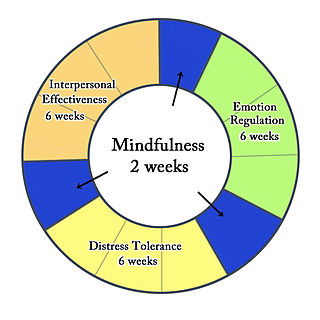Related Research Articles

Cognitive behavioral therapy (CBT) is a psycho-social intervention that aims to reduce symptoms of various mental health conditions, primarily depression and anxiety disorders. Cognitive behavioral therapy is one of the most effective means of treatment for substance abuse and co-occurring mental health disorders. CBT focuses on challenging and changing cognitive distortions and their associated behaviors to improve emotional regulation and develop personal coping strategies that target solving current problems. Though it was originally designed to treat depression, its uses have been expanded to include many issues and the treatment of many mental health conditions, including anxiety, substance use disorders, marital problems, ADHD, and eating disorders. CBT includes a number of cognitive or behavioral psychotherapies that treat defined psychopathologies using evidence-based techniques and strategies.
Post-traumatic stress disorder (PTSD) is a mental and behavioral disorder that develops from experiencing a traumatic event, such as sexual assault, warfare, traffic collisions, child abuse, domestic violence, or other threats on a person's life or well-being. Symptoms may include disturbing thoughts, feelings, or dreams related to the events, mental or physical distress to trauma-related cues, attempts to avoid trauma-related cues, alterations in the way a person thinks and feels, and an increase in the fight-or-flight response. These symptoms last for more than a month after the event. Young children are less likely to show distress, but instead may express their memories through play. A person with PTSD is at a higher risk of suicide and intentional self-harm.

Dialectical behavior therapy (DBT) is an evidence-based psychotherapy that began with efforts to treat personality disorders and interpersonal conflicts. Evidence suggests that DBT can be useful in treating mood disorders and suicidal ideation as well as for changing behavioral patterns such as self-harm and substance use. DBT evolved into a process in which the therapist and client work with acceptance and change-oriented strategies and ultimately balance and synthesize them—comparable to the philosophical dialectical process of thesis and antithesis, followed by synthesis.

Physical abuse is any intentional act causing injury, trauma, bodily harm or other physical suffering to another person or animal by way of bodily contact. Physical abuse is a type of abuse that involves physical violence, such as hitting, kicking, pushing, biting, choking, throwing objects, and using weapons. Physical abuse also includes using restraints or confinement, such as tying someone up, locking them in a room, or restraining them with drugs or alcohol. Physical abuse can also include withholding basic needs, such as food, clothing, or medical care. In addition to the physical injuries caused by physical abuse, it can also lead to psychological trauma, such as fear, anxiety, depression, and post-traumatic stress disorder. Physical abuse can occur in any relationship, including those between family members, partners, and caregivers. It can also occur in institutional settings, such as nursing homes, schools, and prisons. Physical abuse can have long-term physical, psychological, and social consequences, and can even be fatal.
Dissociation is a concept that has been developed over time and which concerns a wide array of experiences, ranging from a mild emotional detachment from the immediate surroundings, to a more severe disconnection from physical and emotional experiences. The major characteristic of all dissociative phenomena involves a detachment from reality, rather than a false perception of reality as in psychosis.
Psychological trauma is an emotional response caused by severe distressing events that are outside the normal range of human experiences, with extreme examples being violence, rape, or a terrorist attack. The event must be understood by the affected person as directly threatening the affected person or their loved ones with death, severe bodily injury, or sexual violence; indirect exposure, such as from watching television news, may be extremely distressing and can produce an involuntary and possibly overwhelming physiological stress response, but does not produce trauma per se.
Complex post-traumatic stress disorder (CPTSD) is a stress-related mental disorder generally occurring in response to complex traumas, i.e., commonly prolonged or repetitive exposures to a series of traumatic events, within which individuals perceive little or no chance to escape.
Gender is correlated with the prevalence of certain mental disorders, including depression, anxiety and somatic complaints. For example, women are more likely to be diagnosed with major depression, while men are more likely to be diagnosed with substance abuse and antisocial personality disorder. There are no marked gender differences in the diagnosis rates of disorders like schizophrenia and bipolar disorder. Men are at risk to suffer from post-traumatic stress disorder (PTSD) due to past violent experiences such as accidents, wars and witnessing death, and women are diagnosed with PTSD at higher rates due to experiences with sexual assault, rape and child sexual abuse. Nonbinary or genderqueer identification describes people who do not identify as either male or female. People who identify as nonbinary or gender queer show increased risk for depression, anxiety and post-traumatic stress disorder. People who identify as transgender demonstrate increased risk for depression, anxiety, and post-traumatic stress disorder.
Childhood trauma is often described as serious adverse childhood experiences (ACEs). Children may go through a range of experiences that classify as psychological trauma; these might include neglect, abandonment, sexual abuse, emotional abuse, and physical abuse, witnessing abuse of a sibling or parent, or having a mentally ill parent. These events have profound psychological, physiological, and sociological impacts and can have negative, lasting effects on health and well-being such as unsocial behaviors, attention deficit hyperactivity disorder (ADHD), and sleep disturbances. Similarly, children whose mothers have experienced traumatic or stressful events during pregnancy have an increased risk of mental health disorders and other neurodevelopmental disorders.
Memory and trauma is the deleterious effects that physical or psychological trauma has on memory.
Cognitive processing therapy (CPT) is a manualized therapy used by clinicians to help people recover from posttraumatic stress disorder (PTSD) and related conditions. It includes elements of cognitive behavioral therapy (CBT) treatments, one of the most widely used evidence-based therapies. A typical 12-session run of CPT has proven effective in treating PTSD across a variety of populations, including combat veterans, sexual assault victims, and refugees. CPT can be provided in individual and group treatment formats and is considered one of the most effective treatments for PTSD.
PTSD or post-traumatic stress disorder, is a psychiatric disorder characterised by intrusive thoughts and memories, dreams or flashbacks of the event; avoidance of people, places and activities that remind the individual of the event; ongoing negative beliefs about oneself or the world, mood changes and persistent feelings of anger, guilt or fear; alterations in arousal such as increased irritability, angry outbursts, being hypervigilant, or having difficulty with concentration and sleep.

Transgenerational trauma is the psychological and physiological effects that the trauma experienced by people has on subsequent generations in that group. The primary modes of transmission are the uterine environment during pregnancy causing epigenetic changes in the developing embryo, and the shared family environment of the infant causing psychological, behavioral and social changes in the individual. The term intergenerational transmission refers to instances whereby the traumatic effects are passed down from the directly traumatized generation [F0] to their offspring [F1], and transgenerational transmission is when the offspring [F1] then pass the effects down to descendants who have not been exposed to the initial traumatic event - at least the grandchildren [F2] of the original sufferer for males, and their great-grandchildren [F3] for females.
Trauma focused cognitive behavioral therapy (TF-CBT) is an evidence-based psychotherapy or counselling that aims at addressing the needs of children and adolescents with post traumatic stress disorder (PTSD) and other difficulties related to traumatic life events. This treatment was developed and proposed by Drs. Anthony Mannarino, Judith Cohen, and Esther Deblinger in 2006. The goal of TF-CBT is to provide psychoeducation to both the child and non-offending caregivers, then help them identify, cope, and re-regulate maladaptive emotions, thoughts, and behaviors. Research has shown TF-CBT to be effective in treating childhood PTSD and with children who have experienced or witnessed traumatic events, including but not limited to physical or sexual victimization, child maltreatment, domestic violence, community violence, accidents, natural disasters, and war. More recently, TF-CBT has been applied to and found effective in treating complex posttraumatic stress disorder.
Post-traumatic stress disorder (PTSD) can affect about 3.6% of the U.S. population each year, and 6.8% of the U.S. population over a lifetime. 8.4% of people in the U.S. are diagnosed with substance use disorders (SUD). Of those with a diagnosis of PTSD, a co-occurring, or comorbid diagnosis of a SUD is present in 20–35% of that clinical population.

Internet-based treatments for trauma survivors is a growing class of online treatments that allow for an individual who has experienced trauma to seek and receive treatment without needing to attend psychotherapy in person. The progressive movement to online resources and the need for more accessible mental health services has given rise to the creation of online-based interventions aimed to help those who have experienced traumatic events. Cognitive behavioral therapy (CBT) has shown to be particularly effective in the treatment of trauma-related disorders and adapting CBT to an online format has been shown to be as effective as in-person CBT in the treatment of trauma. Due to its positive outcomes, CBT-based internet treatment options for trauma survivors has been an expanding field in both research and clinical settings.
Cannabis use and trauma is the contribution that trauma plays in promoting the use and potential abuse of cannabis. Conversely, cannabis use has been associated with the intensity of trauma and PTSD symptoms. While evidence of efficacious use of cannabis is growing in novelty, it is not currently recommended.
Sexual trauma therapy is medical and psychological interventions provided to survivors of sexual violence aiming to treat their physical injuries and cope with mental trauma caused by the event. Examples of sexual violence include any acts of unwanted sexual actions like sexual harassment, groping, rape, and circulation of sexual content without consent.
Being exposed to traumatic events such as war, violence, disasters, loss, injury or illness can cause trauma. Additionally, the most common diagnostic instruments such as the ICD-11 and the DSM-5 expand on this definition of trauma to include perceived threat to death, injury, or sexual violence to self or a loved one. Even after the situation has passed, the experience can bring up a sense of vulnerability, hopelessness, anger and fear.
LGBT trauma is the distress an individual experiences due to being a lesbian, gay, bisexual, trans, queer person or from possessing another minoritized sexual or gender identity. This distress can be harmful to the individual and predispose them to trauma- and stressor-related disorders.
References
- ↑ Jalal, Baland; Kruger, Qunessa; Hinton, Devon E. (May 2018). "Adaptation of CBT for Traumatized South African Indigenous Groups: Examples from Multiplex CBT for PTSD". Cognitive and Behavioral Practice. 25 (2): 335–349. doi:10.1016/j.cbpra.2017.07.003.
- 1 2 3 Sikkema, Kathleen J.; Mulawa, Marta I.; Robertson, Corne; Watt, Melissa H.; Ciya, Nonceba; Stein, Dan J.; Cherenack, Emily M.; Choi, Karmel W.; Kombora, Matapelo; Joska, John A. (March 2018). "Improving AIDS Care After Trauma (ImpACT): Pilot Outcomes of a Coping intervention Among HIV-Infected Women with Sexual Trauma in South Africa". AIDS and Behavior. 22 (3): 1039–1052. doi:10.1007/s10461-017-2013-1. PMC 5828984 . PMID 29270789.
- 1 2 3 Choi, Karmel W.; Sikkema, Kathleen J.; Velloza, Jennifer; Marais, Adele; Jose, Cicyn; Stein, Dan J.; Watt, Melissa H.; Joska, John A. (October 2015). "Maladaptive coping mediates the influence of childhood trauma on depression and PTSD among pregnant women in South Africa". Archives of Women's Mental Health. 18 (5): 731–738. doi:10.1007/s00737-015-0501-8. PMC 4500677 . PMID 25578632.
- 1 2 3 Sommer, Jessica; Hinsberger, Martina; Elbert, Thomas; Holtzhausen, Leon; Kaminer, Debra; Seedat, Soraya; Madikane, Solomon; Weierstall, Roland (January 2017). "The interplay between trauma, substance abuse and appetitive aggression and its relation to criminal activity among high-risk males in South Africa". Addictive Behaviors. 64: 29–34. doi:10.1016/j.addbeh.2016.08.008. PMC 5102240 . PMID 27540760.
- ↑ Padmanabhanunni, Anita (December 2017). "A review of the transportability of cognitive therapy for the treatment of PTSD among South African rape survivors". Health SA Gesondheid. 22: 268–274. doi: 10.1016/j.hsag.2017.01.005 . hdl: 10566/3965 .
- ↑ Edwards, David J. A. (January 2009). "Treating Posttraumatic Stress Disorder in South Africa: An Integrative Model Grounded in Case-Based Research". Journal of Psychology in Africa. 19 (2): 189–198. CiteSeerX 10.1.1.834.6137 . doi:10.1080/14330237.2009.10820278. S2CID 146169428.
- 1 2 DeAngelis[ full citation needed ]